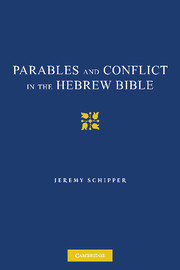Book contents
- Frontmatter
- Contents
- Preface
- Abbreviations
- 1 Breaking Down Parables: Introductory Issues
- 2 Devouring Parables: Jotham's Parabolic Curse in Judges 9
- 3 Overallegorizing and Other Davidic Misinterpretations in 2 Samuel 11–12
- 4 Changing Face and Saving Face: Parabolic Petitions in 2 Samuel 14
- 5 Grasping the Conflict: Ahab's Negotiation of Conflicts and Parables in 1 Kings 20
- 6 Intellectual Weapons: The Parable's Function in 2 Kings 14 and 2 Chronicles 25
- 7 Conclusions and Implications for the Study of Hebrew Bible Parables
- Notes
- Works Cited
- Scriptural and Extra-Biblical Texts Index
- General Index
2 - Devouring Parables: Jotham's Parabolic Curse in Judges 9
Published online by Cambridge University Press: 30 September 2009
- Frontmatter
- Contents
- Preface
- Abbreviations
- 1 Breaking Down Parables: Introductory Issues
- 2 Devouring Parables: Jotham's Parabolic Curse in Judges 9
- 3 Overallegorizing and Other Davidic Misinterpretations in 2 Samuel 11–12
- 4 Changing Face and Saving Face: Parabolic Petitions in 2 Samuel 14
- 5 Grasping the Conflict: Ahab's Negotiation of Conflicts and Parables in 1 Kings 20
- 6 Intellectual Weapons: The Parable's Function in 2 Kings 14 and 2 Chronicles 25
- 7 Conclusions and Implications for the Study of Hebrew Bible Parables
- Notes
- Works Cited
- Scriptural and Extra-Biblical Texts Index
- General Index
Summary
“The fable is used to pour scorn on Abimelech … to prepare the way for the pronouncement of Jotham's curse in v. 20.”
–Barry G. Webb, The Book of Judges: An Integrated Reading“It will become clear that the primary focus of the chapter is not upon kingship as such, but upon the mutual conflict between Abimelech and the men of Shechem.”
–Graham S. Ogden, “Jotham's Fable: Its Structure and Function in Judges 9”Jotham's parable in Judges 9 provides an excellent point of entry into this book's study of Hebrew Bible parables. Jotham is the lone survivor of his brother Abimelech's massacre of 70 of his siblings (v. 5). As with the parables in 2 Samuel 12 and 14, Jotham's parable addresses a conflict, specifically a murder that nearly destroys a kinship network. Yet, clearly, Jotham does not intend his parable to prompt any change of behavior among his addressees, namely the lords of Shechem. Nor does he show any concern for conflict resolution through his parable. He shows no interest in hearing how the Shechemites understand his parable. In fact, after he speaks his parable, he leaves immediately, without even giving them an opportunity to respond (v. 21).
Instead, the parable helps strengthen the judgment that Jotham calls down upon Abimelech, the house of Millo, and the lords of Shechem. By comparing their situation to the curse portion of his story, Jotham reinforces the negative judgment that his addressees face.
- Type
- Chapter
- Information
- Parables and Conflict in the Hebrew Bible , pp. 23 - 40Publisher: Cambridge University PressPrint publication year: 2009

